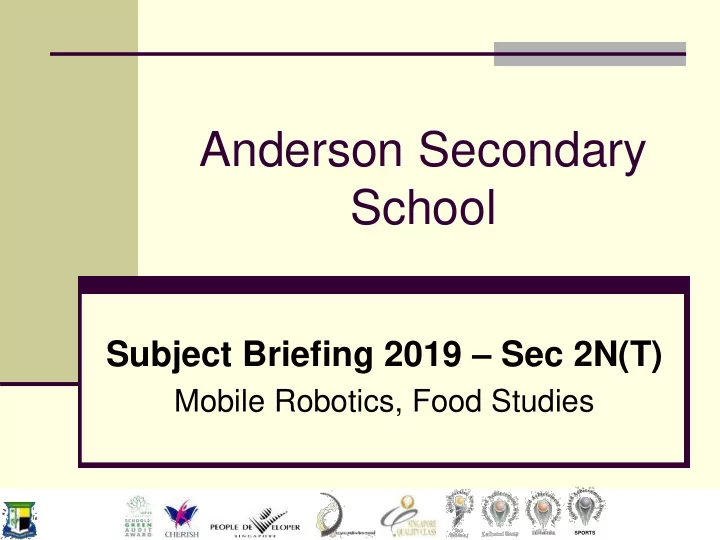

Anderson Secondary School Subject Briefing 2019 – Sec 2N(T) Mobile Robotics, Food Studies SPORTS
Objectives of Mobile Robotics (MR) To engage students in a learning mode that best suits their learning styles and needs; and To provide students early exposure to possible post-secondary courses of study and future work opportunities. 3
Why Mobile Robotics (MR) ? Learning that is connected to real-life applications, mostly concrete and hands-on Taught and assessed in a mode students can excel in Aligned to ITE courses and industry needs 4
3 hrs per week Mobile Robotics (MR) Aims to provide students with the experience of developing their own mobile robots and equip them with basic knowledge and skills in electrical, electronics, mechanical design and intelligent control. Related Nitec Electricity and Robotics Courses Mechatronics Electronics Rapid Transit Technology Mechanical Technology Electronics Basic Electricity Mobile Robotics – Introduction Basic and Digital Design Electronics Simple Mechanism Material and Practical Processes Integration SPORTS
Related Nitec Courses Nitec in Mechatronics College Central and West Nitec in Rapid Transit Technology College West Images obtained from www.ite.edu.sg
Related Nitec Courses Nitec in Mechanical Technology College Central, East and West Nitec in Electronics College Central, East and West Images obtained from www.ite.edu.sg
Possible Progression Opportunities To apply for the Nitec in Engineering or Electronics & Info-comm Technology courses, you need to have: or relevant Subject Grade A - D or 1 - 5 Note: Applicants applying for this GCE ‘N’ level passes in Mathematics or course must ensure that they do not Science and 2 other subjects suffer from colour-appreciation deficiency Duration and Venue This is a two-year course and is available at: ITE College East, ITE College West, ITE College Central 8
Mobile Robotics Assessment Overview • Mobile Robotics - Introduction • Design Practical Assessment at End of Electricity and Secondary 3 Electronics Theory Examination • Basic Electricity at End of • Basic and Digital Secondary 4 Electronics • Input-Output Device Robotics Practical • Simple Mechanism Assessment • Material and Practical at End of Processes Secondary 4 • Integration
How is Mobile Robotics assessed? Written and practical components constituting 30% and 70% respectively of the final score Scheduled within the GCE N-Level Examination Timetable each year. 10
Certification & ITE Admission Jointly certified by MOE and ITE Considered as equivalent to an N-level subject for admission to ITE Nitec courses MR can be used in lieu of N(T) Science/ Maths for admission into selected Nitec courses that require a pre-requisite pass in these subjects (see next two slides). 11
Courses where MR can be used in lieu of NT Sci/Maths for admission 12
Courses where MR can be used in lieu of NT Sci/Maths for admission 13
Food Studies
Food Studies To develop students’ understanding on food commodities To equip students with the knowledge and skills to plan and prepare healthy meals using a variety of food commodities and methods of cooking. To develop students’ understanding of the basic concepts nutrition and meal planning and their impact on health.
Examination Requirments Paper 1 (Written Exam) . . . . . 40% - 1.5 hrs written paper Paper 2 (Coursework) ……… 60% - Coursework (6 months to complete)
Paper 1 (Written Exam) Section A: 20 marks (short-answer) Section B: 28 marks (data response) Section C: 32 marks (structured type) Sub-total: 80 marks
Paper 2 (Coursework) ASSESSMENT SCHEME Background Study Exploration Decision making Planning Execution – organisation and management – method – product and presentation Evaluation
Progression Some ITE courses that you can use Food Studies for the computation : - Nitec in Applied Food Science - Nitec in Asian Culinary Arts - Nitec in Food & Beverage Operations - Nitec in Pastry & Baking - Nitec in Western Culinary Arts
Recommend
More recommend